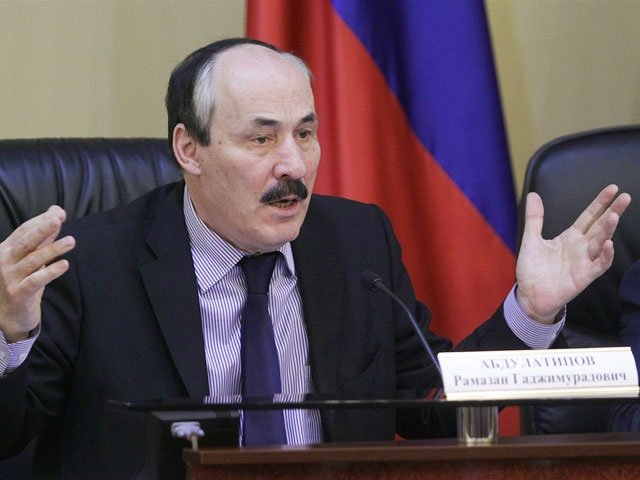
Dagestan’s Governor Meets Stiff Opposition From Powerful Local Groups
Publication: Eurasia Daily Monitor Volume: 12 Issue: 132
By:

Shortly after Moscow dispatched Ramazan Abdulatipov to rule Dagestan in 2013, the new governor managed to depose the most influential politician of the republic at the time—Said Amirov, the mayor of the republican capital of Makhachkala. Amirov was accused of a variety of crimes and has remained under arrest ever since. Following Amirov’s downfall, some observers thought Abdulatipov could soon win full control over the republic (see EDM, June 7, 2013). However, it now appears that Dagestan’s governor is facing opposition increasingly crystalizing around local leaders and ethnic elites in the republic.
Abdulatipov has struggled for several months to dismiss Makhachkala’s new mayor, Magomed Suleimanov. According to the independent newspaper Chernovik, after Abdulatipov appointed Suleimanov as the city’s mayor, the latter demanded greater autonomy for his office. Instead, Abdulatipov reportedly continued handpicking people for the Makhachkala city administration, which Suleimanov resented. On June 25, Abdulatipov sharply criticized Suleimanov at a session of the republican parliament. A special Makhachkala city council meeting to dismiss the mayor was scheduled for June 29, but it was postponed. On June 30, the police prevented Suleimanov’s car from entering the city administration’s grounds, but the mayor powered his way through on foot. In response to pressure, Suleimanov tweeted: “As-salamu alaykum, dear Makhachkalians! I continue to work in the usual way for the benefit of the capital city.” The mayor also issued a warning to the utilities company EKO-M, which is responsible for cleaning the city and is affiliated with Abdulatip Abdulatipov, the son of the Dagestani governor. Dagestan’s governor apparently retaliated by causing “sporadic” problems with electricity in Makhachkala, which provoked anger from residents in the city administration. With the conflict between the republican governor and the mayor of the republican capital taking the form of an administrative war, one of Moscow’s envoys to the North Caucasian Federal District, Vasily Kolesnikov, was dispatched to negotiate with Suleimanov (Chernovik, July 3). Ultimately, Suleimanov gave in to pressure and stepped down as mayor but was restored to his previous position in the state medical insurance company (Chernovik, July 10).
In accordance with the unwritten rules of Dagestan’s political arrangement, the position of Makhachkala mayor has normally gone to ethnic Dargins, who are the second-largest ethnic group in Dagestan after the Avars. Ramazan Abdulatipov is an ethnic Avar and smaller ethnic groups appear to have united against what they see as ethnic-Avar domination of the republic. Lezgins are another large and influential ethnic group in the republic that has been increasingly willing to challenge Abdulatipov’s management style.
The mayor of another major Dagestani city, Derbent, located in southern Dagestan, has also been involved in a protracted conflict with the republican governor. Imam Yaraliev, a former Dagetsani general prosecutor, has withstood the pressure of the republican leadership for months. Some observers have alleged that despite Abdulatipov’s attempts to stoke southern Dagestan’s historical ethnic rivalries, pitting the Lezgins on one side, and the Azeris and Tabasarans on the other, the three ethnic groups started to unite behind the figure of Imam Yaraliev and are even receiving support from Dargin districts to the north. Many influential people in Dagestan are apparently upset about Abdulatipov’s management style, which envisages complete control over all processes in the republic. After he was appointed governor of Dagestan, Abdulatipov reportedly asked the recruiting agency Ward Howell to help recruit professionals for administrative positions in the republic. However, young technocrats of Dagestani origin largely rejected such jobs because they were not given sufficient autonomy. Dagestani observers note that Abdulatipov is trying to copy the management style of President Vladimir Putin, but has failed to achieve the same level of obedience from the elites. Instead he has simply antagonized the various ethnic groups, who have responded by seeking new alliances to counterbalance the republican governor (Onkavkaz.com, July 8).
Another interesting conflict is taking place between Dagestan’s republican government and its Ministry of Interior, which is under federal authority. The Republican TV company, which belongs to the republican government, recently featured a program that exposed torture and beatings by the Dagestani police. After the programs were aired, the police launched an investigation into the TV company. The TV company’s deputy head, Aleksei Kazak, is an expert on the Russian State Duma’s Committee for Nationalities. In addition, according to unconfirmed reports, Kazak studied together with one of Ramazan Abdulatipov’s sons. What appears to be a proxy conflict between Abdulatipov and the interior ministry is taking place against the backdrop of a formal peace between the two sides, and even local observers are puzzled about the real reasons for the outbreak in tension (Chernovik, July 10).
The Dagestani governor’s initial successes in taming the regional elites appears to be coming to a halt, with the republican elites increasingly moving into political opposition to Abdulatipov. Unlike Russia, Dagestan has no protracted history as a highly centralized state, and it is also more fragmented ethnically than Russia as a whole. In addition, Russian government agencies probably have conflicting agendas in the republic. Abdulatipov obviously does not have the same resources as Putin, so he will have to adjust to the republic’s diversity or continue waging wars on an increasingly bold opposition.




